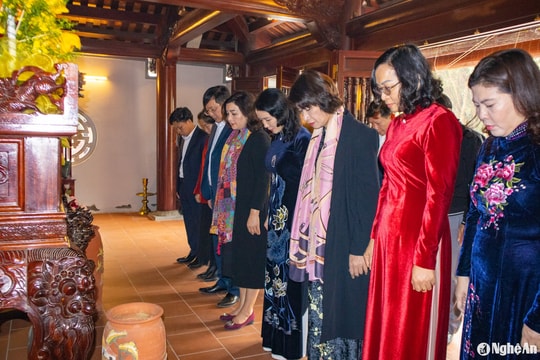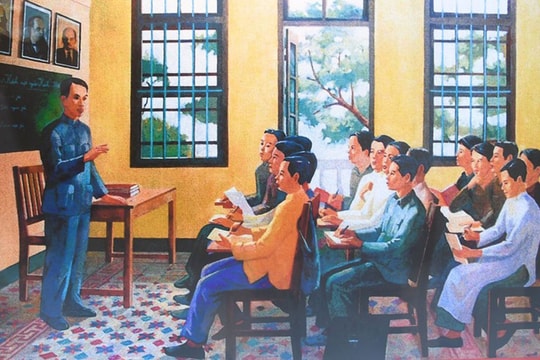The Eastern Travel Movement and Phan Boi Chau's national liberation ideology
(Baonghean.vn) - Towards the 150th anniversary of the birth of patriot Phan Boi Chau, let's review with Nghe An Newspaper the Dong Du movement initiated by him.
In 1868, the Meiji period began in Japan. This period was a period of innovation for Japan, with the experimentation of realpolitik to redefine the Imperial system. Japan opened up completely and especially encouraged the study of English. But during this period, Japan faced the threat of the West.
Therefore, the reform of the entire country was also aimed at resisting foreign powers. But before the stubbornness of the Japanese people, China and the Tsar (Russia) were defeated one after another. That victory of Japan had a profound impact on the whole world.
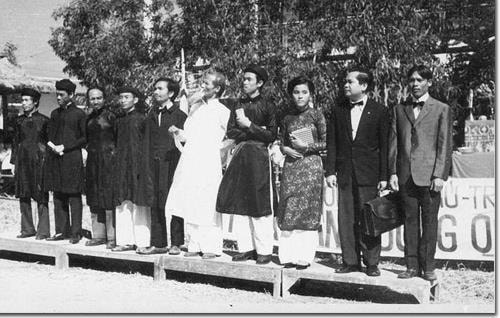 |
| Images of the Eastern Travel Movement (provided by the French Cultural Center) |
In Vietnam during this period, the uprising movements of many patriots failed consecutively, and our people had to continue living in slavery and misery. The patriot Phan Boi Chau (1867-1940) founded the Duy Tan Association to promote the patriotic movement in the country. However, finding a way to save the country and liberate the people was a difficult task.
This was also the period when new documents related to the world situation and patriotic movements were widely disseminated. Phan Boi Chau was not immune to the influence of these documents. Unlike other patriots, he chose his own path, the path of national liberation, Phan Boi Chau.
Phan Boi Chau, with the belief that he would rely on Japan to fight against the French, established the Dong Du (going East) movement. With the purpose of studying Japan, in January 1905, for the first time, a number of Vietnamese scholars led by Phan Boi Chau went to Japan. From the introduction of Liang Qichao, the Vietnamese scholars met a number of patriots and supporters of Vietnam such as Okumura, Kashiwabara Buntaro, and doctor Asaba Sakitaro.
Phan Boi Chau also agreed with the Japanese proposal to send Vietnamese students to study in Japan, creating a revolutionary movement later.
Since 1906, the Dong Du movement has been increasingly active in all three regions of the country, a series of works by Phan Boi Chau were translated from Chinese into Quoc Ngu and sent back to the country. From 1907-1908 was the period when the Dong Du movement developed most strongly with over 200 students studying abroad.
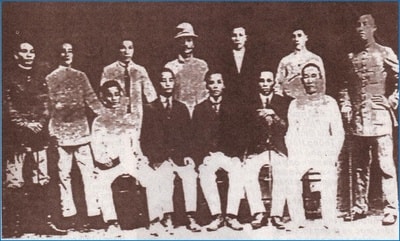 |
| Some students studying abroad in the Eastern Travel Movement (1905-1909). |
At the same time, two important figures of the ruling Progressive Party in Japan, Okuma Shigenobu and Prime Minister Inukai Tsuyoshi, advised Phan Boi Chau to encourage young people to study abroad so that they could return to help the country. From this support, Vietnamese youth focused on their studies, hoping to contribute to the cause of national liberation in the future.
The curriculum here is quite diverse, mornings and noons teach Japanese, “general knowledge”, afternoons teach “military knowledge”, especially “military practice”. When Vietnamese students study in Japanese schools, the curriculum and rules at school are all determined by the Japanese, while outside of school, they are managed by ourselves. Phan Boi Chau and his comrades established the Vietnam Cong Hien Association (October 1907) with its own curriculum.
Phan Boi Chau was the General Director and the Marquis Cuong De was the President of the Association. Under the general authority of the Executive Board, the Association was divided into 4 Departments, each Department in charge of each aspect of the activities of overseas students.
The members of the Ministry of Economy play an important role in revenue collection, expenditure and preparation. At the same time, they are also good at mobilizing and seeking help both at home and abroad. Viet Nam Cong Hien pays great attention to organizing "political activities" to help students practice revolutionary ideology and ethics.
Phan Boi Chau once confided: “I naturally acted as a Consul of the Vietnamese nation abroad, but also held the position of Inspector General. A deep well, short hands, great work, small talent, I was still afraid that I would not be able to handle the work. At the same time, we set up the New Vietnamese Public Constitution to imitate a provisional government of the Vietnamese nation abroad. Although the arrangement was still rudimentary, it quickly influenced the people's spirit in the country.”
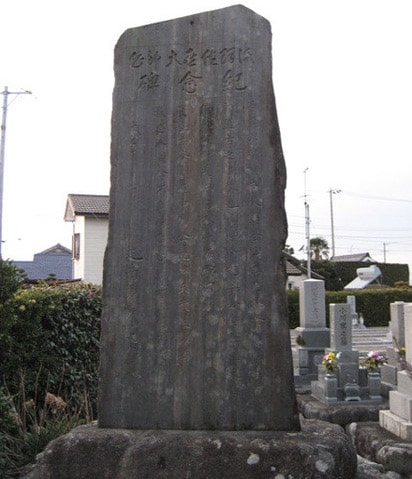 |
| Memorial stele erected by Phan Boi Chau in Japan to commemorate the contributions of his great friend Asaba Sakitaro |
It was also at this time that the French colonialists discovered many clues of the movement. In September 1908, when the students of Chan Vo School were holding their graduation ceremony, there was an order to dissolve the Vietnamese student organization, confiscate documents, and expel the students from Japan. In February 1909, Phan Boi Chau and Cuong De were also expelled from Japan.
Faced with that situation, Phan Boi Chau and his comrades had to take refuge in China, and work in Siam for a while, waiting for new opportunities.
The situation at that time was very difficult, the cost of sending overseas students back to the country became a big problem for Phan Boi Chau. At this time, Dr. Asaba Sakitaro donated 1700 yen. This amount of money helped many Vietnamese students. Not only at this time, before that, Dr. Asaba also helped a lot in terms of material support for the establishment of Phan Boi Chau's Dong Du movement.
It was this selfless and pure help that later, when the sea was calm, Phan Boi Chau and some other brothers went to Asaba's hometown (who had passed away by then) to erect a memorial stele in memory of this benefactor. The stele's inscription reads: "Better than ever before, full of kindness inside and out. You helped like the sky, I endured like the sea, My will was not yet fulfilled, You did not wait for me. My heart aches for hundreds of thousands of years. All members of the Vietnam Officials Association, please remember this."
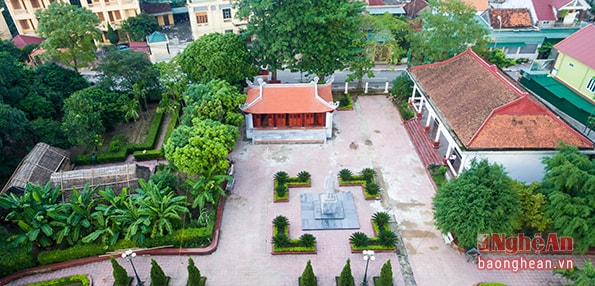 |
| Panoramic view of Phan Boi Chau relic site in Nam Dan town (Nghe An). |
In 2003, on the occasion of the 85th anniversary of the erection of the memorial stele by Phan Boi Chau, the Patriotic Association of OWA province solemnly organized this commemoration ceremony. A number of Vietnamese scientists also attended the ceremony. In 2010, on the occasion of the 105th anniversary of the Dong Du movement, on the Japanese side, the Asaba Association of Vietnam organized a commemoration ceremony for Phan Boi Chau and presented the Vietnam History Museum with a relief and model of the Asaba stele.
During his stay in Japan, Phan Boi Chau wrote letters expressing his feelings for Japan and calling for the Japanese people's help in the Vietnamese national liberation movement. In addition, he wrote many works expressing his patriotism and admiration for his Japanese friends.
|
Peace
(Synthetic)
| RELATED NEWS |
|---|

